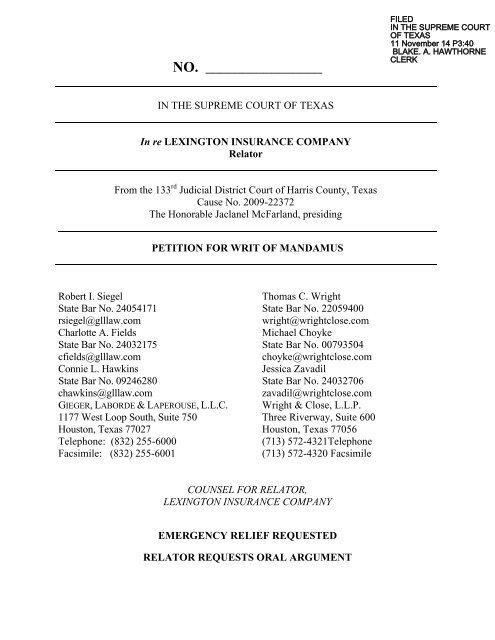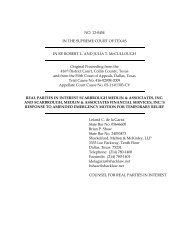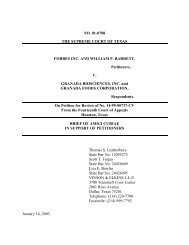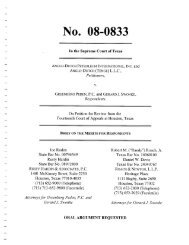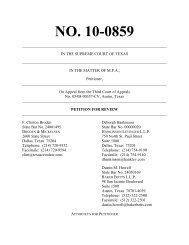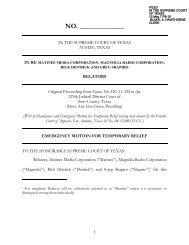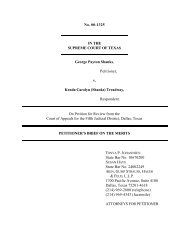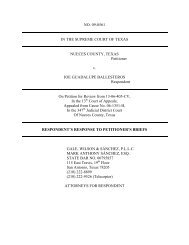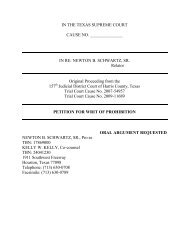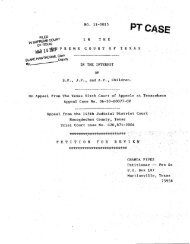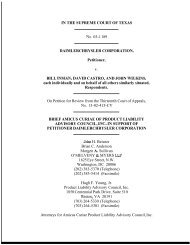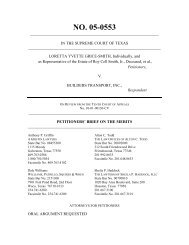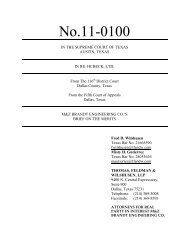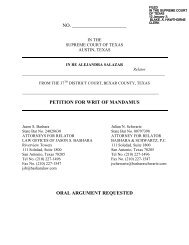Petition for Writ of Mandamus - Supreme Court of Texas
Petition for Writ of Mandamus - Supreme Court of Texas
Petition for Writ of Mandamus - Supreme Court of Texas
Create successful ePaper yourself
Turn your PDF publications into a flip-book with our unique Google optimized e-Paper software.
NO. ________________<br />
FILED<br />
IN THE SUPREME COURT<br />
OF TEXAS<br />
11 November 14 P3:40<br />
BLAKE. A. HAWTHORNE<br />
CLERK<br />
IN THE SUPREME COURT OF TEXAS<br />
In re LEXINGTON INSURANCE COMPANY<br />
Relator<br />
From the 133 rd Judicial District <strong>Court</strong> <strong>of</strong> Harris County, <strong>Texas</strong><br />
Cause No. 2009-22372<br />
The Honorable Jaclanel McFarland, presiding<br />
PETITION FOR WRIT OF MANDAMUS<br />
Robert I. Siegel<br />
State Bar No. 24054171<br />
rsiegel@glllaw.com<br />
Charlotte A. Fields<br />
State Bar No. 24032175<br />
cfields@glllaw.com<br />
Connie L. Hawkins<br />
State Bar No. 09246280<br />
chawkins@glllaw.com<br />
GIEGER, LABORDE & LAPEROUSE, L.L.C.<br />
1177 West Loop South, Suite 750<br />
Houston, <strong>Texas</strong> 77027<br />
Telephone: (832) 255-6000<br />
Facsimile: (832) 255-6001<br />
Thomas C. Wright<br />
State Bar No. 22059400<br />
wright@wrightclose.com<br />
Michael Choyke<br />
State Bar No. 00793504<br />
choyke@wrightclose.com<br />
Jessica Zavadil<br />
State Bar No. 24032706<br />
zavadil@wrightclose.com<br />
Wright & Close, L.L.P.<br />
Three Riverway, Suite 600<br />
Houston, <strong>Texas</strong> 77056<br />
(713) 572-4321Telephone<br />
(713) 572-4320 Facsimile<br />
COUNSEL FOR RELATOR,<br />
LEXINGTON INSURANCE COMPANY<br />
EMERGENCY RELIEF REQUESTED<br />
RELATOR REQUESTS ORAL ARGUMENT
IDENTITY OF PARTIES AND COUNSEL<br />
Relator:<br />
Lexington Insurance Company<br />
Counsel <strong>for</strong> Relator:<br />
Robert I. Siegel<br />
rsiegel@glllaw.com<br />
Charlotte A. Fields<br />
cfields@glllaw.com<br />
Connie L. Hawkins<br />
chawkins@glllaw.com<br />
Gieger, Laborde & Laperouse, L.L.C.<br />
1177 West Loop South, Suite 750<br />
Houston, <strong>Texas</strong> 77027<br />
(832) 255-6000 Telephone<br />
(832) 255-6001 Facsimile<br />
Thomas C. Wright<br />
wright@wrightclose.com<br />
Michael Choyke<br />
choyke@wrightclose.com<br />
Jessica Zavadil<br />
zavadil@wrightclose.com<br />
Wright & Close, L.L.P.<br />
Three Riverway, Suite 600<br />
Houston, <strong>Texas</strong> 77056<br />
(713) 572-4321Telephone<br />
(713) 572-4320 Facsimile<br />
Respondent:<br />
Hon. Jaclanel McFarland<br />
133 rd Judicial District <strong>Court</strong><br />
Harris County Civil <strong>Court</strong>house<br />
201 Caroline, 11 th Floor<br />
Houston, <strong>Texas</strong> 77002<br />
ii
Real Parties in Interest:<br />
JAW The Lake, L.L.C.<br />
JAW Timberwalk, L.L.C.<br />
JAW Scarsdale Park, L.L.C.<br />
JAW Boardwalk <strong>of</strong> Baytown, L.L.C.<br />
JAW Chateau Creole, L.L.C.<br />
Counsel <strong>for</strong> Real Parties in Interest:<br />
James L. Cornell<br />
State Bar No. 04834800<br />
jcornell@cornell-pardue.com<br />
Cornell & Pardue<br />
2727 Allen Parkway, Suite 1675<br />
Houston, <strong>Texas</strong> 77019<br />
(713) 526-0500 Telephone<br />
(713) 526-7974 Facsimile<br />
Marc E. Gravely<br />
State Bar No. 00787582<br />
mgravely@gplawfirm.com<br />
Matthew R. Pearson<br />
State Bar No. 00788173<br />
mpearson@gplawfirm.com<br />
Gravely & Pearson, L.L.P.<br />
425 Soledad, Suite 600<br />
San Antonio, <strong>Texas</strong> 78205<br />
(210) 472-1111 Telephone<br />
(210) 472-1110 Facsimile<br />
Brendan K. McBride<br />
State Bar No. 24008900<br />
brendan.mcbride@att.net<br />
McBride Law Firm<br />
Of Counsel to Gravely & Pearson, L.L.P.<br />
425 Soledad, Suite 600<br />
San Antonio, <strong>Texas</strong> 78205<br />
(210) 227-1200 Telephone<br />
(210) 881-6752 Facsimile<br />
iii
TABLE OF CONTENTS<br />
IDENTITY OF PARTIES AND COUNSEL ...................................................................... ii<br />
TABLE OF CONTENTS ................................................................................................... iv<br />
TABLE OF AUTHORITIES ............................................................................................... v<br />
STATEMENT OF THE CASE ........................................................................................ viii<br />
STATEMENT OF JURISDICTION .................................................................................. ix<br />
ISSUES PRESENTED ........................................................................................................ x<br />
STATEMENT OF FACTS .................................................................................................. 1<br />
SUMMARY OF ARGUMENT ........................................................................................... 5<br />
ARGUMENT ....................................................................................................................... 6<br />
I. THE TRIAL COURT CLEARLY ABUSED ITS DISCRETION BY<br />
ORDERING PRODUCTION OF IRRELEVANT DOCUMENTS<br />
IN RESPONSE TO OVERBROAD REQUESTS ................................................... 6<br />
II.<br />
III.<br />
THE TRIAL COURT CLEARLY ABUSED ITS DISCRETION BY<br />
ORDERING PRODUCTION IN LIGHT OF<br />
UNCONTROVERTED EVIDENCE OF UNDUE BURDEN .............................. 10<br />
THE TRIAL COURT CLEARLY ABUSED ITS DISCRETION BY<br />
DENYING PROTECTION AFTER UNCONTROVERTED<br />
EVIDENCE OF PRIVILEGE ................................................................................ 12<br />
IV. LEXINGTON HAS NO ADEQUATE REMEDY ON APPEAL ......................... 14<br />
PRAYER ........................................................................................................................... 16<br />
VERIFICATION ............................................................................................................... 18<br />
CERTIFICATION ............................................................................................................. 19<br />
CERTIFICATE OF SERVICE .......................................................................................... 20<br />
INDEX TO APPENDIX .................................................................................................... 21<br />
iv
TABLE OF AUTHORITIES<br />
Cases<br />
Alpha Life Ins. Co. v. Gayle,<br />
796 S.W.2d 834 (Tex. App.—Houston [14 th Dist.] 1990, orig. proceeding) ................ 14<br />
Bennett v. Reynolds,<br />
315 S.W.3d 867 (Tex. 2010) ........................................................................................... 7<br />
Fethkenher v. Kroger Co.,<br />
139 S.W.3d 24 (Tex. App.—Fort Worth 2004, no pet.) ............................................... 11<br />
Horizon/CMS Healthcare Corp. v. Auld,<br />
34 S.W.3d 887 (Tex. 2000) ........................................................................................... 10<br />
Humphreys v. Caldwell,<br />
888 S.W.2d 469 (Tex. 1994) (orig. proceeding) ........................................................... 14<br />
In re AIU Ins. Co.,<br />
148 S.W.3d 109 (Tex. 2004) (orig. proceeding) ........................................................... 15<br />
In re Al<strong>for</strong>d Chevrolet-Geo,<br />
997 S.W.2d 173 (Tex. 1999) (orig. proceeding) ........................................................... 11<br />
In re Allstate County Mut. Ins. Co.,<br />
227 S.W.3d 667 (Tex. 2007) (orig. proceeding) ......................................................... 7, 8<br />
In re CSX Corp.,<br />
124 S.W.3d 149 (Tex. 2003) (orig. proceeding) ....................................................... 6, 15<br />
In re E.I. DuPont de Nemours and Co.,<br />
136 S.W.3d 218 (Tex. 2004) (orig. proceeding) ........................................................... 13<br />
In re GMAC Direct Ins. Co.,<br />
No. 09-10-00493-CV, 2010 WL 5550672 (Tex. App.--Beaumont 2010, orig.<br />
proceeding) ...................................................................................................................... 8<br />
In re Graco Children’s Products, Inc.,<br />
210 S.W.3d 598 (Tex. 2006) (orig. proceeding) ........................................................... 15<br />
v
In re Harco Nat’l Ins. Co.,<br />
No. 2-09-351-CV, 2010 WL 2555629 (Tex. App.—Fort Worth 2010, orig. proceeding)<br />
....................................................................................................................................... 13<br />
In re Harris,<br />
315 S.W.3d 685 (Tex. App.—Houston [1 st Dist.] 2010, orig. proceeding) .................. 15<br />
In re Hochheim Prairie Farm Mutual Insurance Association,<br />
296 S.W.3d 907 (Tex. App.—Corpus Christi-Edinburg 2009, orig. proceeding) .......... 9<br />
In re Jacobs,<br />
300 S.W.3d 35 (Tex. App.—Houston [14 th Dist.] 2009, orig. proceeding) .................... 6<br />
In re John Crane, Inc.,<br />
No. 01-03-00698-CV, 2003 WL 22682613 (Tex. App.—Houston [1 st Dist.] 2003, orig.<br />
proceeding) .................................................................................................................... 12<br />
In re McAllen Med. Ctr., Inc.,<br />
275 S.W.3d 458 (Tex. 2008) ......................................................................................... 14<br />
In re Mobil Oil Corp.,<br />
No. 09-06-392-CV, 2006 WL 3028063 (Tex. App.—Beaumont 2006, orig.<br />
proceeding) .................................................................................................................... 10<br />
In re Prudential Ins. Co. <strong>of</strong> Am.,<br />
148 S.W.3d 124 (Tex. 2004) (orig. proceeding) ........................................................... 15<br />
In re SCI <strong>Texas</strong> Funeral Serv., Inc.,<br />
236 S.W.3d 759 (Tex. 2007) (orig. proceeding) ............................................................. 7<br />
In re Sears, Roebuck & Co.,<br />
123 S.W.3d 573 (Tex. App.—Houston [14 th Dist.] 2003, orig. proceeding) .......... 12, 15<br />
In re Steadfast Ins. Co.,<br />
No. 01-09-00235-CV, 2009 WL 1424634 (Tex. App.—Houston [1 st Dist.] 2009, orig.<br />
proceeding) .................................................................................................................... 11<br />
In re Team Rocket, L.P.,<br />
256 S.W.3d 257 (Tex. 2008) (orig. proceeding) ........................................................... 14<br />
In re U.S.A.A.,<br />
76 S.W.3d 112 (Tex. App.—San Antonio 2002, orig. proceeding) .............................. 14<br />
vi
In re Union Pacific Resources Co.,<br />
22 S.W.3d 338 (Tex. 1999) (orig. proceeding) ............................................................. 12<br />
Luns<strong>for</strong>d v. Morris,<br />
746 S.W.2d 471 Tex. 1992) (orig. proceeding) ............................................................... 6<br />
Phillip Morris U.S.A. v. Williams,<br />
549 U.S. 346 (2007) .................................................................................................... 7, 8<br />
Pittsburgh Corning Corp. v. Caldwell,<br />
861 S.W.2d 423 (Tex. 1993) (orig. proceeding) ........................................................... 13<br />
Texaco, Inc. v. Sanderson,<br />
898 S.W.2d 813 (Tex. 1995) (orig. proceeding) ........................................................... 10<br />
<strong>Texas</strong> Tech Univ. Health Sci. Ctr. v. Apodaca,<br />
876 S.W.2d 402 (Tex. App.—El Paso 1994, writ denied) ............................................ 13<br />
Walker v. Packer,<br />
827 S.W.2d 833 (Tex. 1992) (orig. proceeding) ........................................................... 15<br />
Statutes<br />
TEX. GOV’T CODE § 22.002 ................................................................................................ ix<br />
Rules<br />
TEX. R. CIV. P. 192.3(a) ....................................................................................................... 6<br />
TEX. R. CIV. P. 192.4(b) ............................................................................................ 10, 12<br />
TEX. R. CIV. P. 192.5 ....................................................................................................... 12<br />
TEX. R. CIV. P. 193.4(a) .................................................................................................. 12<br />
TEX. R. EVID. 401 ................................................................................................................ 6<br />
TEX. R. EVID. 503 .............................................................................................................. 12<br />
vii
STATEMENT OF THE CASE<br />
Nature <strong>of</strong> underlying case:<br />
Respondent:<br />
Respondent’s action:<br />
<strong>Court</strong> <strong>of</strong> appeals:<br />
Claims <strong>for</strong> contractual and extra-contractual damages<br />
arising from Plaintiffs’ Hurricane Ike claims under an<br />
insurance policy issued by Lexington. (R. 8) 1<br />
Hon. Jaclanel McFarland<br />
133 rd Judicial District <strong>Court</strong><br />
Harris County, <strong>Texas</strong><br />
August 16, 2011, Order Granting In Part Defendant’s<br />
Motion to Reconsider Order Plaintiffs’ Expedited<br />
Motion to Compel Discovery. (R. 27; App. 1) 2<br />
Denied mandamus relief via memorandum opinion<br />
issued on October 27, 2011, in which no reason <strong>for</strong> the<br />
denial was given. (R. 28; App. 2)<br />
1 References to the tabbed and numbered documents in the mandamus record will be cited as “R. ___.”<br />
2 References to the tabbed and numbered documents in the mandamus appendix will be cited as “App.<br />
___.”<br />
viii
STATEMENT OF JURISDICTION<br />
This <strong>Court</strong> may properly exercise jurisdiction over this original proceeding<br />
pursuant to TEX. GOV’T CODE § 22.002, which gives this <strong>Court</strong> writ power.<br />
ix
ISSUES PRESENTED<br />
1. Did the trial court clearly abuse its discretion by ordering Lexington to<br />
produce patently irrelevant documents relating to insurance claims beyond<br />
those at issue in the underlying case?<br />
2. Did the trial court clearly abuse its discretion by ordering production <strong>of</strong><br />
documents in light <strong>of</strong> Lexington’s uncontroverted evidence as to undue<br />
burden?<br />
3. Did the trial court clearly abuse its discretion by denying protection after<br />
Lexington produced uncontroverted evidence that the documents sought are<br />
privileged?<br />
4. Does Lexington have an adequate remedy on appeal?<br />
x
STATEMENT OF FACTS<br />
Lexington Insurance Company issued a commercial property policy, No. 3258064,<br />
to Nations Asset Management, L.P. (CAT) (“NAM”) with coverage dates <strong>of</strong> March 31,<br />
2008, to April 1, 2009 (the “Primary Policy”). (R. 3A) NAM was <strong>for</strong>med <strong>for</strong> the sole<br />
purpose <strong>of</strong> purchasing commercial property insurance from Lexington, as well as various<br />
excess carriers. (R. 2A at 3) Plaintiffs in the underlying lawsuit 3 own five apartment<br />
complexes that are among the approximately 300 different commercial properties in six<br />
states that were insured under the Primary Policy. (R. 3B at 5) Coverage under the<br />
Primary Policy <strong>for</strong> any one occurrence, regardless <strong>of</strong> the number <strong>of</strong> locations making<br />
claims, was limited to $25 million. (R. 3A)<br />
Plaintiffs and at least 139 other entities asserted claims under the Primary Policy<br />
<strong>for</strong> damages allegedly caused to their properties by Hurricane Ike in September 2008. (R.<br />
8 and 19) Lexington made payments totaling $25 million—the limit <strong>of</strong> the Primary<br />
Policy. (R. 3F, Ex. 1) It is undisputed that the $25 million limit <strong>of</strong> the Primary Policy was<br />
exhausted by these payments on January 8, 2010. (R. 2A at 2 n.2)<br />
Plaintiffs filed five separate lawsuits complaining <strong>of</strong> Lexington’s handling <strong>of</strong><br />
Hurricane Ike claims, which were ultimately consolidated in the 133rd District <strong>Court</strong> <strong>of</strong><br />
Harris County. (R. 12) Plaintiffs seek declaratory relief as to coverage <strong>for</strong> their properties<br />
under the Primary Policy, as well as damages <strong>for</strong> breach <strong>of</strong> contract, violations <strong>of</strong> the<br />
Insurance Code and the <strong>Texas</strong> DTPA, and common-law bad faith. (R. 8, 19)<br />
3 Plaintiffs (and Real Parties in Interest) are JAW The Lake, L.L.C.; JAW Timberwalk, L.L.C.; JAW<br />
Scarsdale Park, L.L.C.; JAW Boardwalk <strong>of</strong> Baytown, L.L.C.; and JAW Chateau Creole, L.L.C.<br />
1
Plaintiffs propounded Requests <strong>for</strong> Production, to which Lexington timely<br />
responded. (R. 1A, 3F, 10) Only two <strong>of</strong> Plaintiffs’ requests are potentially relevant to this<br />
proceeding. Request <strong>for</strong> Production No. 20 asks <strong>for</strong> “[t]he complete claims file <strong>for</strong> all<br />
claims filed under NAM 20088064-01.” (R. 3F at 9) However, Lexington did not issue<br />
any policy bearing that number. (R. 1A at 16) Accordingly, there are no documents<br />
responsive to this request. Request <strong>for</strong> Production No. 37 states: “Produce all claims files<br />
<strong>for</strong> all claimants listed on the attached Exhibit 1.” (R. 3F at 11) Exhibit 1 to Plaintiffs’<br />
Requests <strong>for</strong> Production is a four-page chart showing 154 payments made by Lexington<br />
under the Primary Policy to 75 different claimants <strong>for</strong> Hurricane Ike claims (the<br />
“Payment Chart”). (R. 3F, Ex. 1) Those payments totaled $25 million. (Id.) By its plain<br />
language, Request No. 37 does not seek production <strong>of</strong> claims files other than those<br />
entities identified on the Payment Chart.<br />
Lexington objected to both requests because, among other things, the requests are<br />
overbroad; the requests seek irrelevant documents; the requests “would impose an<br />
unreasonable burden in time and expense”; the requests constitute “an impermissible<br />
‘fishing expedition’”; the requests would require the production <strong>of</strong> documents exempt<br />
from discovery under the attorney-client, work product, or joint defense privilege; and the<br />
requests seek production <strong>of</strong> confidential, proprietary documents related to other insureds,<br />
potentially in violation <strong>of</strong> Lexington’s duties to those insureds. (R. 1A at 16-17, 27)<br />
Plaintiffs filed an “Expedited Motion to Compel Discovery” on May 2, 2011. In<br />
their motion, Plaintiffs asked <strong>for</strong> “production <strong>of</strong> the other claim files under the NAM<br />
policy.” (R. 1) Lexington responded by arguing: (1) the documents sought are irrelevant<br />
2
and beyond the scope <strong>of</strong> proper discovery; (2) the requests are overbroad as a matter <strong>of</strong><br />
law; and (3) the requested documents necessarily include privileged and confidential<br />
in<strong>for</strong>mation. (R. 2) Lexington also moved <strong>for</strong> entry <strong>of</strong> a protective order. (Id.)<br />
Following a hearing on June 13, 2011, the trial court signed an order granting<br />
Plaintiffs’ motion “in all particulars” and ordering Lexington to comply within 60 days,<br />
or by August 12, 2011. (R. 3D) Lexington filed a Motion to Reconsider. (R. 3, 5) In<br />
addition to re-urging its earlier arguments, Lexington argued that production would be<br />
unduly burdensome, and submitted an affidavit detailing the time and expense it would<br />
require <strong>for</strong> Lexington to review and produce the requested claims files. (R. 5E) The<br />
affidavit also confirmed that the requested files contain in<strong>for</strong>mation protected by<br />
attorney-client and work-product privileges as well as confidential third-party<br />
in<strong>for</strong>mation. (Id.) Plaintiffs did not object to this affidavit, aside from one sentence in<br />
their response asserting generally that the affidavit is conclusory. (R. 7 at 2).<br />
When the trial court failed to rule on Lexington’s motion to reconsider by August<br />
10, 2011, Lexington filed a petition <strong>for</strong> writ <strong>of</strong> mandamus in the court <strong>of</strong> appeals. (R. 20)<br />
At Lexington’s request, the appellate court stayed the June 13 order until the trial court<br />
ruled on Lexington’s motion to reconsider and abated the mandamus proceeding pending<br />
the trial court’s ruling. (R. 21, 22)<br />
On August 16, 2011, Plaintiffs’ counsel sent a letter to the trial judge advising her<br />
<strong>of</strong> the appellate court’s actions. (R. 13) Plaintiffs’ counsel further stated that, to<br />
“accommodate the concerns <strong>of</strong> Lexington,” Plaintiffs would agree to limit their document<br />
requests so that Lexington would not have to produce “at this time” portions <strong>of</strong> the claims<br />
3
files consisting <strong>of</strong> certain computer-generated estimates. (Id.) Plaintiffs’ counsel provided<br />
the court with a proposed order “which reflects this compromise.” (Id.) However,<br />
Plaintiffs never communicated this proposed “compromise” to Lexington. Although the<br />
August 16 letter indicates that a copy was sent to Lexington’s counsel, Lexington did not<br />
receive a copy until 9:37 PM that evening. (R. 13, 14) By then, however, it was too late—<br />
the trial court had already signed Plaintiffs’ proposed order without alteration. (App. 1)<br />
The trial court’s August 16 order provides as follows:<br />
(App. 1) By expressly “consider[ing]” Lexington’s motion to reconsider, vacating its<br />
prior order, and purporting to grant Lexington’s motion, the trial court presumptively<br />
considered Lexington’s arguments and the evidence Lexington presented. However, the<br />
August 16 order did not address any <strong>of</strong> Lexington’s substantive objections, but rather<br />
merely carved out from production “at this time” Lexington’s computer-generated loss<br />
estimates <strong>for</strong> each claim. (Id.) The order also required Lexington to produce the<br />
documents by September 12, 2011. (Id.)<br />
4
On September 9, 2011, Lexington sought mandamus relief from the August 16<br />
order and requested a stay. (R. 24, 25) The court <strong>of</strong> appeals granted the stay and<br />
instructed Plaintiffs to file a response. (R. 26) The appellate court denied the mandamus<br />
petition in a memorandum opinion on October 27, 2011, without giving the reasons <strong>for</strong><br />
its denial. (App. 2)<br />
Plaintiffs filed a Motion <strong>for</strong> Sanctions and to Compel Documents on November 10<br />
and set it <strong>for</strong> hearing on Tuesday, November 15, at 10:00 AM. (R. 29) Along with this<br />
<strong>Petition</strong>, Lexington is filing an emergency motion seeking a stay <strong>of</strong> the trial court’s<br />
August 16 order.<br />
SUMMARY OF ARGUMENT<br />
Lexington produced competent, uncontroverted evidence substantiating its<br />
objections to Plaintiffs’ discovery requests. The trial court disregarded such evidence,<br />
instead adopting a proposed order submitted by Plaintiffs requiring production <strong>of</strong><br />
insurance claims files unrelated to those in the underlying lawsuit. The order improperly<br />
mandates production <strong>of</strong> patently irrelevant materials in response to facially overbroad<br />
requests. Such materials are protected from discovery by the attorney-client and workproduct<br />
privileges, as well as third-party privacy rights. Compliance with the order would<br />
impose precisely the type <strong>of</strong> undue burden and expense on Lexington that the courts <strong>of</strong><br />
this state have routinely protected against. The trial court abused its discretion, and<br />
Lexington is entitled to extraordinary relief as it has no adequate remedy by appeal.<br />
5
ARGUMENT<br />
I. THE TRIAL COURT CLEARLY ABUSED ITS DISCRETION BY<br />
ORDERING PRODUCTION OF IRRELEVANT DOCUMENTS IN<br />
RESPONSE TO OVERBROAD REQUESTS<br />
The trial court ordered Lexington to produce claim files <strong>for</strong> at least 70 Hurricane<br />
Ike claimants other than the Plaintiffs. These files have no relevance to any <strong>of</strong> the issues<br />
in this case—whether Plaintiffs’ claims were covered under the Primary Policy and<br />
whether Lexington properly handled Plaintiffs’ claims. (R. 8, 19) The scope <strong>of</strong><br />
permissible discovery is measured by the claims pending in the live pleadings. Luns<strong>for</strong>d<br />
v. Morris, 746 S.W.2d 471, 473 (Tex. 1992) (orig. proceeding). Only relevant, nonprivileged<br />
matters are discoverable, and requests must be “reasonably calculated to lead<br />
to the discovery <strong>of</strong> admissible evidence.” TEX. R. CIV. P. 192.3(a); TEX. R. EVID. 401.<br />
Requests encompassing time periods or activities beyond those at issue in the specific<br />
case are overbroad. In re Jacobs, 300 S.W.3d 35, 44 (Tex. App.—Houston [14 th Dist.]<br />
2009, orig. proceeding). When determining overbreadth, courts look to whether the<br />
request “could have been more narrowly tailored to avoid including tenuous in<strong>for</strong>mation<br />
and still obtain the necessary, pertinent in<strong>for</strong>mation.” In re CSX Corp., 124 S.W.3d 149,<br />
153 (Tex. 2003) (orig. proceeding).<br />
Lexington’s handling <strong>of</strong> each claim must be evaluated on its own merits and<br />
circumstances. Lexington’s conduct in unrelated claims is irrelevant as it does not make<br />
the possibility that Lexington acted in bad faith with regard to Plaintiffs’ claims more or<br />
less probable. This is not a class action case, and allowing Plaintiffs to conduct discovery<br />
as if it were is simply inequitable. See In re SCI <strong>Texas</strong> Funeral Serv., Inc., 236 S.W.3d<br />
6
759, 760 (Tex. 2007) (orig. proceeding).<br />
Plaintiffs argue that the jury should be able to consider Lexington’s conduct in<br />
handling other Hurricane Ike claims made under the Primary Policy in assessing<br />
exemplary damages <strong>for</strong> common-law bad faith, and additional damages under the DTPA<br />
or <strong>Texas</strong> Insurance Code. (R. 3B at 6; R. 4 at 2) Plaintiffs maintain that the claims files<br />
“may lead to the discovery <strong>of</strong> evidence proving [Lexington’s] ‘institutional bad faith’—<br />
that it was ‘knowingly’ and systematically making misrepresentations and delaying<br />
payment to other insureds as well.” (R. 16 at 3) Neither the caselaw addressing commonlaw<br />
bad faith, the DTPA, nor the <strong>Texas</strong> Insurance Code provide any basis <strong>for</strong> the trier <strong>of</strong><br />
fact to consider a defendant’s prior conduct or handling <strong>of</strong> non-party claims in assessing<br />
the propriety <strong>of</strong> an award <strong>of</strong> additional or exemplary damages. This <strong>Court</strong> has<br />
emphasized that exemplary damages “should center on the unsavoriness <strong>of</strong> the acts, not<br />
the actor.” Bennett v. Reynolds, 315 S.W.3d 867, 875 (Tex. 2010); see also Phillip<br />
Morris U.S.A. v. Williams, 549 U.S. 346, 353-55 (2007).<br />
This <strong>Court</strong> previously addressed discovery <strong>of</strong> in<strong>for</strong>mation regarding unrelated<br />
claims and cases from an insurer in In re Allstate County Mutual Insurance Co., 227<br />
S.W.3d 667 (Tex. 2007) (orig. proceeding). In that instance, the plaintiffs sought<br />
discovery from an insurer and adjuster regarding claims and cases beyond that be<strong>for</strong>e the<br />
trial court. Id. at 669. The <strong>Court</strong> granted mandamus relief, noting that<br />
the plaintiffs’ requests and the trial court’s order [compelling production<br />
<strong>of</strong> documents] reflect a misunderstanding about relevance. American<br />
jurisprudence goes to some length to avoid the spurious inference that<br />
defendants are either guilty or liable if they have been found guilty or<br />
liable <strong>of</strong> anything be<strong>for</strong>e. While such evidence might be discoverable in<br />
7
some cases (e.g., to prove motive or intent), it is hard to see why<br />
reneging on some other settlement <strong>of</strong>fer makes it more or less probable<br />
that the insurer reneged on this one.<br />
Id. at 669-70 (internal citations omitted).<br />
In this case, Plaintiffs exhibit a similar misunderstanding by seeking discovery<br />
regarding Lexington’s conduct in adjusting unrelated claims. Plaintiffs admit that this<br />
discovery is intended to support an award <strong>of</strong> exemplary or additional damages based on<br />
Lexington’s handling <strong>of</strong> other insureds’ claims. (R. 16 at 3) Such an award would be<br />
unconstitutional as violative <strong>of</strong> Lexington’s due process rights under Williams. See 549<br />
U.S. at 353-55.<br />
In In re GMAC Direct Insurance Co., the court <strong>of</strong> appeals granted mandamus<br />
relief from a trial court’s order similar to this one compelling an insurer to produce<br />
in<strong>for</strong>mation and documents relating to unrelated claims. No. 09-10-00493-CV, 2010 WL<br />
5550672 (Tex. App.—Beaumont Dec. 30, 2010, orig. proceeding). The insureds, who<br />
brought contractual and extra-contractual claims against their insurer, argued that the<br />
discovery was “designed to produce evidence <strong>of</strong> a company-wide business practice <strong>for</strong><br />
which [the insureds] may recover additional damages and exemplary damages.” Id. at *1.<br />
The Beaumont <strong>Court</strong> <strong>of</strong> Appeals rejected this argument, concluding instead that the<br />
insureds’ request constituted a “fishing expedition that harvests vast amounts <strong>of</strong> tenuous<br />
in<strong>for</strong>mation along with the pertinent in<strong>for</strong>mation that was used in adjusting the<br />
[insureds’] claim.” Id. As in GMAC, Plaintiffs’ discovery is overbroad and not narrowly<br />
tailored to only include relevant in<strong>for</strong>mation and documents. See id. at *2.<br />
Another illustrative case on relevance is In re Hochheim Prairie Farm Mutual<br />
8
Insurance Association, 296 S.W.3d 907 (Tex. App.—Corpus Christi-Edinburg 2009,<br />
orig. proceeding), which involved claims by three different insureds against their insurer<br />
<strong>for</strong> breach <strong>of</strong> contract, bad faith, DTPA, and Insurance Code violations. The trial court<br />
denied the insurer’s request to sever the insureds’ claims into separate lawsuits based on<br />
the insureds’ argument that the claims should be tried together to demonstrate the<br />
insurer’s pattern and practice to underpay or delay payments to the insureds. Id. at 910.<br />
The appellate court concluded that the trial court abused its discretion by failing to sever<br />
these unrelated claims into different lawsuits:<br />
Although the property damage in each <strong>of</strong> the three claims was caused by<br />
the same weather event, and although each <strong>of</strong> the claims was handled by<br />
the same adjuster, other issues <strong>for</strong> each claim must be resolved on their<br />
own merits. Specifically, the underlying factual situations <strong>for</strong> each <strong>of</strong><br />
the three claims is unique and should there<strong>for</strong>e be handled separately,<br />
including whether each claim was covered under the insurance policies<br />
at issue; the amount <strong>of</strong> damages sustained in each claim; and whether<br />
[the insurer] complied with its policy and comcomitant legal obligations<br />
in the investigation and handling <strong>of</strong> each claim.<br />
Id. at 912. Because the facts underlying the handling <strong>of</strong> each claim under the Primary<br />
Policy are likewise unique, the claims files <strong>for</strong> claimants other than the Plaintiffs have no<br />
relevance to this lawsuit.<br />
The <strong>for</strong>egoing authorities notwithstanding, Plaintiffs’ own words may be the most<br />
damning evidence <strong>of</strong> the unrelated claims files’ irrelevance. On July 22, 2009, Plaintiffs<br />
opposed another defendant’s motion to consolidate their claims by arguing that, even as<br />
among the Plaintiffs, the evidence supporting each individual claim was unique:<br />
These six cases involve six different Plaintiffs and six different<br />
Properties… The Plaintiffs are different legal entities; the Properties are<br />
different apartment complexes that have nothing in common; the extent<br />
9
<strong>of</strong> the damages are different; and the handling <strong>of</strong> the claims by<br />
Defendant is different…The evidence <strong>for</strong> each case is different.<br />
(R. 3H at 3) (emphasis added) Plaintiffs have judicially admitted that each claim should<br />
stand or fall on its own merits, and should be estopped from contending otherwise in their<br />
ef<strong>for</strong>ts to embark on a fishing expedition into Lexington’s records. See Horizon/CMS<br />
Healthcare Corp. v. Auld, 34 S.W.3d 887, 905 (Tex. 2000). The discovery compelled is<br />
not reasonably tailored to matters only relevant to Plaintiffs’ claims and will not lead to<br />
the discovery <strong>of</strong> admissible evidence. Texaco, Inc. v. Sanderson, 898 S.W.2d 813, 815<br />
(Tex. 1995) (orig. proceeding). The claims files Plaintiffs seek simply cannot be relevant<br />
to resolution <strong>of</strong> the issues in this case and the trial court abused its discretion by ordering<br />
production <strong>of</strong> patently irrelevant documents. In re Mobil Oil Corp., No. 09-06-392-CV,<br />
2006 WL 3028063, at *3 (Tex. App.—Beaumont 2006, orig. proceeding).<br />
II.<br />
THE TRIAL COURT CLEARLY ABUSED ITS DISCRETION BY<br />
ORDERING PRODUCTION IN LIGHT OF UNCONTROVERTED<br />
EVIDENCE OF UNDUE BURDEN<br />
Relevance notwithstanding, discovery may still be limited upon a determination<br />
by the trial court that the “burden or expense <strong>of</strong> the proposed discovery outweighs its<br />
likely benefit, taking into account the needs <strong>of</strong> the case, the amount in controversy, the<br />
parties’ resources, the importance <strong>of</strong> the issues at stake in the litigation, and the<br />
importance <strong>of</strong> the proposed discovery in resolving the issues.” TEX. R. CIV. P. 192.4(b).<br />
Lexington timely objected that production <strong>of</strong> the unrelated claim files would impose an<br />
undue burden in terms <strong>of</strong> both time and expense. (R. 1A at 16, 27) Lexington tendered<br />
supporting evidence that the trial court considered, but apparently rejected, when the<br />
10
court purportedly granted Lexington’s motion to reconsider the June 13 order. (R. 5E)<br />
A similar situation was addressed in In re Steadfast Ins. Co., No. 01-09-00235-<br />
CV, 2009 WL 1424634 (Tex. App.—Houston [1 st Dist.] 2009, orig. proceeding). The<br />
plaintiff asserted claims against an insurer <strong>for</strong> common-law bad faith and violations <strong>of</strong><br />
the DTPA and <strong>Texas</strong> Insurance Code. Id. at *1. Among other things, the plaintiff sought<br />
the “entire claim file <strong>for</strong> each claim in which [the insurer has] been alleged to have acted<br />
in bad faith or in breach <strong>of</strong> an insurance agreement.” Id. After the trial court ordered the<br />
insurer to produce the materials, the insurer produced an affidavit substantiating that<br />
compliance with the court’s order would cost at least $160,000. Id. at *2. The appellate<br />
court held that the discovery requests were overbroad, not narrowly tailored, and<br />
constituted an impermissible fishing expedition by the plaintiff. Id. at *4. The insurer was<br />
ultimately relieved <strong>of</strong> the obligation to produce the claims files by the appellate court’s<br />
conditional granting <strong>of</strong> the insured’s petition <strong>for</strong> writ <strong>of</strong> mandamus. Id.<br />
Lexington’s undisputed affidavit evidence shows compliance with Plaintiffs’<br />
request (which would require production <strong>of</strong> 72 claims files) would take up to 15 days <strong>of</strong><br />
Lexington employee time, up to 142 days <strong>of</strong> attorney time, and would cost up to<br />
$227,200 in attorneys’ fees plus copying costs, delivery charges, and other related<br />
expenses. (R. 5E) <strong>Texas</strong> courts have found this type <strong>of</strong> undue burden to be improper.<br />
See e.g., In re Al<strong>for</strong>d Chevrolet-Geo, 997 S.W.2d 173, 181 (Tex. 1999) (orig.<br />
proceeding); Fethkenher v. Kroger Co., 139 S.W.3d 24, 30 (Tex. App.—Fort Worth<br />
2004, no pet.). “In order to justify the cost <strong>of</strong> producing documents and in<strong>for</strong>mation,<br />
there must be a likely benefit.” In re Sears, Roebuck & Co., 123 S.W.3d 573, 578 (Tex.<br />
11
App.—Houston [14 th Dist.] 2003, orig. proceeding) (citing TEX. R. CIV. P. 192.4(b)).<br />
In its various pleadings both in the trial court and the court <strong>of</strong> appeals, Plaintiffs<br />
respond to Lexington’s burdensomeness objections by (1) excluding from its request “at<br />
this time” computerized repair estimates, and (2) conceding that Lexington does not have<br />
to produce privileged documents. (R. 7 at 2, 4) However, Plaintiffs’ proposed limitations<br />
on the number <strong>of</strong> documents Lexington ultimately produces fails to take into account the<br />
source <strong>of</strong> Lexington’s objection—that the claims files at issue will still need to be<br />
reviewed by Lexington and its attorneys to identify privileged in<strong>for</strong>mation and responsive<br />
documents prior to production. (R. 1A at 16, 27; R. 5E) Even if the documents and<br />
in<strong>for</strong>mation in question were within the permissible scope <strong>of</strong> discovery—which<br />
Lexington denies—the exorbitant cost <strong>of</strong> compliance with the August 16 Order would<br />
outweigh any benefit Plaintiffs could possibly glean from the materials. See In re John<br />
Crane, Inc., No. 01-03-00698-CV, 2003 WL 22682613, at *5 (Tex. App.—Houston [1 st<br />
Dist.] 2003, orig. proceeding).<br />
III.<br />
THE TRIAL COURT CLEARLY ABUSED ITS DISCRETION BY<br />
DENYING PROTECTION AFTER UNCONTROVERTED EVIDENCE OF<br />
PRIVILEGE<br />
The attorney-client and work product privileges are set <strong>for</strong>th in TEX. R. EVID. 503<br />
and TEX. R. CIV. P. 192.5, respectively. This <strong>Court</strong> has held that evidence is not always<br />
necessary to support a claim <strong>of</strong> privilege in avoidance <strong>of</strong> discovery. See e.g., In re Union<br />
Pacific Resources Co., 22 S.W.3d 338, 341 (Tex. 1999) (orig. proceeding) (citing TEX.<br />
R. CIV. P. 193.4(a)). Nevertheless, when a party resisting discovery produces evidence<br />
establishing a prima facie showing <strong>of</strong> privilege, the burden shifts to the requesting party<br />
12
to refute the applicability <strong>of</strong> privilege. In re Harco Nat’l Ins. Co., No. 2-09-351-CV, 2010<br />
WL 2555629, at *3 (Tex. App.—Fort Worth 2010, orig. proceeding). “The prima facie<br />
standard requires only the ‘minimum quantum <strong>of</strong> evidence necessary to support a rational<br />
inference that the allegation <strong>of</strong> fact is true.’” In re E.I. DuPont de Nemours and Co., 136<br />
S.W.3d 218, 223 (Tex. 2004) (orig. proceeding) (quoting <strong>Texas</strong> Tech Univ. Health Sci.<br />
Ctr. v. Apodaca, 876 S.W.2d 402, 407 (Tex. App.—El Paso 1994, writ denied)).<br />
Lexington produced an affidavit signed by its counsel, Connie L. Hawkins. (R.<br />
5E) Among other things, Ms. Hawkins identifies the categories <strong>of</strong> in<strong>for</strong>mation and<br />
documents included in the claims files sought by Plaintiffs, and states that such materials<br />
include “confidential financial in<strong>for</strong>mation and trade secrets <strong>of</strong> the insured as well as<br />
communications with Lexington’s attorneys regarding coverage issues and documents<br />
created in anticipation <strong>of</strong> litigation.” (R. 5E at 2)<br />
Lexington made a prima facie showing that the claims files sought by Plaintiffs<br />
are protected by the attorney-client and work product privileges. See In re E.I. DuPont<br />
de Nemours and Co., 136 S.W.3d 218, 223-24 (Tex. 2004) (orig. proceeding); Pittsburgh<br />
Corning Corp. v. Caldwell, 861 S.W.2d 423, 424 (Tex. 1993) (orig. proceeding).<br />
Moreover, Plaintiffs failed to carry their burden to refute the privileged nature <strong>of</strong> the<br />
claims files. See In re Harco Nat’l Ins. Co., No. 2-09-351-CV, 2010 WL 2555629, at *3<br />
(Tex. App.—Fort Worth 2010, orig. proceeding).<br />
Based on the evidence submitted by Lexington, the trial court could reach only<br />
one conclusion—that the claims files are privileged. By ordering production in<br />
contravention <strong>of</strong> such privileges, the trial court abused its discretion. See Humphreys v.<br />
13
Caldwell, 888 S.W.2d 469, 471 (Tex. 1994) (orig. proceeding).<br />
In addition, Lexington produced evidence to support its objection to producing<br />
other insureds’ confidential, proprietary documents. (R. 5E). Discovery may be properly<br />
limited to protect the privacy rights <strong>of</strong> non-party insureds. In re U.S.A.A., 76 S.W.3d 112,<br />
115 (Tex. App.—San Antonio 2002, orig. proceeding); Alpha Life Ins. Co. v. Gayle, 796<br />
S.W.2d 834, 836 (Tex. App.—Houston [14 th Dist.] 1990, orig. proceeding). The trial<br />
court abused its discretion in this case by ordering the unrelated claim files produced in<br />
contravention <strong>of</strong> such rights.<br />
IV.<br />
LEXINGTON HAS NO ADEQUATE REMEDY ON APPEAL<br />
The adequacy <strong>of</strong> an appellate remedy is determined by balancing the benefits <strong>of</strong><br />
mandamus review against the detriments. In re Team Rocket, L.P., 256 S.W.3d 257, 262<br />
(Tex. 2008) (orig. proceeding). <strong>Mandamus</strong> is not limited to cases where there is “no other<br />
legal operative remedy,” but issues when “other modes <strong>of</strong> redress are inadequate or<br />
tedious” or when mandamus af<strong>for</strong>ds “a more complete and effectual remedy.” In re<br />
McAllen Med. Ctr., Inc., 275 S.W.3d 458, 467-68 (Tex. 2008). In reviewing a petition <strong>for</strong><br />
writ <strong>of</strong> mandamus, a court considers: (1) “whether mandamus will preserve important<br />
substantive and procedural rights from impairment or loss,” (2) “whether mandamus will<br />
‘allow the appellate courts to give needed and helpful direction to the law that would<br />
otherwise prove elusive in appeals from final judgments,’” and (3) “whether mandamus<br />
will spare litigants and the public ‘the time and money utterly wasted enduring eventual<br />
reversal <strong>of</strong> improperly conducted proceedings.’” Team Rocket, 256 S.W.3d at 262. Relief<br />
is warranted when a trial court subjects taxpayers, parties, and courts to meaningless<br />
14
proceedings and trials. See id.<br />
This <strong>Court</strong> has held that mandamus relief is appropriate where, as here, the<br />
circumstances demonstrate that allowing the trial proceedings to continue under a trial<br />
court’s erroneous ruling until final judgment and appeal would result in a waste <strong>of</strong><br />
judicial resources and time. In re AIU Ins. Co., 148 S.W.3d 109, 118 (Tex. 2004) (orig.<br />
proceeding). An appellate remedy is simply not “adequate” when waiting <strong>for</strong> it wastes<br />
not only the time and resources <strong>of</strong> the parties but the judiciary as well. Id. Thus, an<br />
appellate remedy is inadequate when the benefits <strong>of</strong> mandamus review outweigh any<br />
potential detriments. In re Prudential Ins. Co. <strong>of</strong> Am., 148 S.W.3d 124, 135-38 (Tex.<br />
2004) (orig. proceeding). The benefits <strong>of</strong> mandamus review clearly outweigh the<br />
detriments in this case.<br />
<strong>Mandamus</strong> relief is warranted in this case because the August 16 Order mandates<br />
production <strong>of</strong> patently irrelevant documents in response to overbroad requests, imposes a<br />
disproportionate burden on Lexington, and would result in the violation <strong>of</strong> multiple<br />
privileges and privacy rights. In re Graco Children’s Products, Inc., 210 S.W.3d 598,<br />
600 (Tex. 2006) (orig. proceeding); In re CSX Corp., 124 S.W.3d 149, 151 (Tex. 2003)<br />
(orig. proceeding); Walker v. Packer, 827 S.W.2d 833, 843 (Tex. 1992); In re Harris, 315<br />
S.W.3d 685, 697-98 (Tex. App.—Houston [1 st Dist.] 2010, orig. proceeding). “Once<br />
time, labor, and money are spent on improper production, there is no undoing them;<br />
wasteful costs may be shifted, but never retrieved.” In re Sears, Roebuck & Co., 123<br />
S.W.3d 573, 575 (Tex. App.—Houston [14 th Dist.] 2003, orig. proceeding). Lexington<br />
will have no adequate remedy on appeal if <strong>for</strong>ced to expend the resources to comply with<br />
15
the August 16 order. It will suffer a similar fate if compelled to produce privileged<br />
in<strong>for</strong>mation and documents. Lexington thus is entitled to extraordinary relief.<br />
PRAYER<br />
Relator, Lexington Insurance Company, respectfully requests that this <strong>Court</strong> issue<br />
a writ <strong>of</strong> mandamus directing Respondent to: 1) vacate her August 16, 2011 order<br />
compelling discovery; 2) sustain Lexington’s objections to Request Nos. 20 and 37; and<br />
3) grant Lexington’s Motion <strong>for</strong> Protective Order.<br />
Respectfully submitted,<br />
Robert I. Siegel<br />
State Bar No. 24054171<br />
rsiegel@glllaw.com<br />
Charlotte A. Fields<br />
State Bar No. 24032175<br />
cfields@glllaw.com<br />
Connie L. Hawkins<br />
State Bar No. 09246280<br />
chawkins@glllaw.com<br />
GIEGER, LABORDE & LAPEROUSE, L.L.C.<br />
1177 West Loop South, Suite 750<br />
Houston, <strong>Texas</strong> 77027<br />
Telephone: (832) 255-6000<br />
Facsimile: (832) 255-6001<br />
and<br />
16
Thomas C. Wright<br />
State Bar No. 22059400<br />
wright@wrightclose.com<br />
Michael Choyke<br />
State Bar No. 00793504<br />
choyke@wrightclose.com<br />
Jessica Zavadil<br />
State Bar No. 24032706<br />
zavadil@wrightclose.com<br />
Wright & Close, L.L.P.<br />
Three Riverway, Suite 600<br />
Houston, <strong>Texas</strong> 77056<br />
(713) 572-4321Telephone<br />
(713) 572-4320 Facsimile<br />
Attorneys <strong>for</strong> Relator<br />
Lexington Insurance Company<br />
17
CERTIFICATION<br />
I hereby certify that I have reviewed the <strong>for</strong>egoing <strong>Petition</strong> <strong>for</strong> <strong>Writ</strong> <strong>of</strong> <strong>Mandamus</strong><br />
and that every statement <strong>of</strong> fact contained therein is supported by competent evidence<br />
included in the appendix or mandamus record.<br />
Charlotte A. Fields<br />
19
CERTIFICATE OF SERVICE<br />
I hereby certify that on this the 14 th day <strong>of</strong> November, 2011, true and correct<br />
copies <strong>of</strong> this <strong>Petition</strong> <strong>for</strong> <strong>Writ</strong> <strong>of</strong> <strong>Mandamus</strong> and <strong>Mandamus</strong> Record were served upon<br />
Respondent and counsel <strong>for</strong> Real Parties in Interest as indicated below in accordance with<br />
TEX. R. APP. P. 9.5:<br />
Hon. Jaclanel McFarland<br />
133 rd Judicial District <strong>Court</strong><br />
Harris County Civil <strong>Court</strong>house<br />
201 Caroline, 11 th Floor<br />
Houston, <strong>Texas</strong> 77002<br />
James L. Cornell<br />
Cornell & Pardue<br />
2727 Allen Parkway, Suite 1675<br />
Houston, <strong>Texas</strong> 77019<br />
Marc E. Gravely<br />
Matthew R. Pearson<br />
Gravely & Pearson, L.L.P.<br />
425 Soledad, Suite 600<br />
San Antonio, <strong>Texas</strong> 78205<br />
Brendan K. McBride<br />
McBride Law Firm<br />
425 Soledad, Suite 600<br />
San Antonio, <strong>Texas</strong> 78205<br />
Brian C. Bassett<br />
Traub Lieberman Straus & Shrewsberry L.L.P.<br />
303 West Madison Street, Suite 1200<br />
Chicago, Illinois 60606<br />
VIA ELECTRONIC FILING<br />
VIA ELECTRONIC FILING<br />
VIA ELECTRONIC FILING<br />
VIA ELECTRONIC FILING<br />
VIA ELECTRONIC FILING<br />
Charlotte A. Fields<br />
20
INDEX TO APPENDIX<br />
1. Order Granting In Part Lexington’s Motion to Reconsider Order Granting<br />
Plaintiffs’ Expedited Motion to Compel Discovery (8/16/11)<br />
2. Memorandum Order Denying Lexington’s <strong>Petition</strong> <strong>for</strong> <strong>Writ</strong> <strong>of</strong> <strong>Mandamus</strong><br />
(10/27/11)<br />
21
APPENDIX TAB 1
Certified Document Number: 49654575 - Page 1 <strong>of</strong> 2
Certified Document Number: 49654575 - Page 2 <strong>of</strong> 2
I, Chris Daniel, District Clerk <strong>of</strong> Harris <br />
County, <strong>Texas</strong> certify that this is a true and <br />
correct copy <strong>of</strong> the original record filed and or <br />
recorded in my <strong>of</strong>fice, electronically or hard <br />
copy, as it appears on this date. <br />
Witness my <strong>of</strong>ficial hand and seal <strong>of</strong> <strong>of</strong>fice<br />
this August 17, 2011<br />
Certified Document Number:<br />
49654575 Total Pages: 2<br />
Chris Daniel, DISTRICT CLERK<br />
HARRIS COUNTY, TEXAS<br />
In accordance with <strong>Texas</strong> Government Code 406.013 electronically transmitted authenticated<br />
documents are valid. If there is a question regarding the validity <strong>of</strong> this document and or seal<br />
please e-mail support@hcdistrictclerk.com
APPENDIX TAB 2
<strong>Petition</strong> <strong>for</strong> <strong>Writ</strong> <strong>of</strong> <strong>Mandamus</strong> Denied and Memorandum Opinion filed October 27,<br />
2011.<br />
In The<br />
Fourteenth <strong>Court</strong> <strong>of</strong> Appeals<br />
____________<br />
NO. 14-11-00780-CV<br />
____________<br />
IN RE LEXINGTON INSURANCE COMPANY, Relator<br />
ORIGINAL PROCEEDING<br />
WRIT OF MANDAMUS<br />
133rd District <strong>Court</strong><br />
Harris County, <strong>Texas</strong><br />
Trial <strong>Court</strong> Cause No. 2009-22372<br />
M E M O R A N D U M<br />
O P I N I O N<br />
This discovery mandamus arises from a suit <strong>for</strong> contractual and extra-contractual<br />
damages from Hurricane Ike claims on five apartment complexes. The apartment<br />
complex owners, JAW The Lake, L.L.C., JAW Timberwalk, L.L.C., JAW Scarsdale Park,<br />
L.L.C., JAW Boardwalk <strong>of</strong> Baytown, L.L.C., and JAW Chateau Creole, L.L.C, the real<br />
parties in interest, filed separate suits against relator, Lexington Insurance Company,<br />
complaining <strong>of</strong> its handling <strong>of</strong> the claims, and the suits were consolidated in the underlying<br />
action.
On September 8, 2011, relator filed an amended petition <strong>for</strong> writ <strong>of</strong> mandamus in<br />
this court. 1 See Tex. Gov't Code § 22.221. Relator asked this court to order the<br />
Honorable Jaclanel McFarland, presiding Judge <strong>of</strong> the 133rd District <strong>Court</strong> <strong>of</strong> Harris<br />
County, <strong>Texas</strong>, to set aside her order signed August 16, 2011, reconsidering her prior order<br />
and granting the real parties in interest’s motion to compel production <strong>of</strong> discovery.<br />
Relator complains that the trial court abused its discretion in ordering unduly burdensome<br />
production <strong>of</strong> irrelevant documents in response to overbroad requests. Relator also asserts<br />
that some documents subject to the court’s order are privileged.<br />
Relator also filed an emergency motion asking that we stay the trial court’s order<br />
pending our review <strong>of</strong> its petition. See Tex. R. App. P. 52.10(a). On September 9, 2011,<br />
this court granted relator’s motion and requested a response from the real parties in interest,<br />
which has now been filed.<br />
<strong>Mandamus</strong> is an extraordinary remedy that will issue only if (1) the trial court<br />
clearly abused its discretion and (2) the party requesting mandamus relief has no adequate<br />
remedy by appeal. In re Prudential Ins. Co. <strong>of</strong> Am., 148 S.W.3d 124, 135–36 (Tex. 2004).<br />
A trial court abuses its discretion if it reaches a decision so arbitrary and unreasonable as to<br />
amount to a clear and prejudicial error <strong>of</strong> law, or if it clearly fails to analyze or apply the<br />
law correctly. In re Cerberus Capital Mgmt., L.P., 164 S.W.3d 379, 382 (Tex. 2005).<br />
Generally, the scope <strong>of</strong> discovery is within the trial court's discretion; however, the<br />
trial court must make an ef<strong>for</strong>t to impose reasonable discovery limits. See In re CSX<br />
Corp., 124 S.W.3d 149, 151 (Tex. 2003). A discovery order that compels overly broad<br />
discovery well outside the bounds <strong>of</strong> proper discovery is an abuse <strong>of</strong> discretion <strong>for</strong> which<br />
mandamus may issue. In re Deere & Co., 299 S.W.3d 819, 820–21 (Tex. 2009). The<br />
party resisting discovery bears the ―heavy burden‖ <strong>of</strong> establishing an abuse <strong>of</strong> discretion<br />
1<br />
Relator’s first petition <strong>for</strong> writ <strong>of</strong> mandamus was dismissed as moot after the trial court granted relator’s<br />
motion to reconsider and vacated its order signed June 13, 2011. See In re Lexington Insurance Company,<br />
No. 14-11-00681-CV, 2011 WL 3925567 (Tex. App.—Houston [14th Dist.] Sept. 8, 2011, orig.<br />
proceeding) (mem. op.).<br />
2
and inadequate appellate remedy. In re CSX, 124 S.W.3d at 151. The party making the<br />
objection must present any evidence necessary to support the objection. See Tex. R. Civ.<br />
P. 193.4(a); In re CI Host, Inc., 92 S.W.3d 514, 516 (Tex. 2002).<br />
Relator has not established that it is entitled to extraordinary relief. Accordingly,<br />
we deny relator’s petition <strong>for</strong> writ <strong>of</strong> mandamus. This court’s September 9, 2011, stay<br />
order is lifted.<br />
PER CURIAM<br />
Panel consists <strong>of</strong> Chief Justice Hedges and Justices Anderson and Christopher.<br />
3


